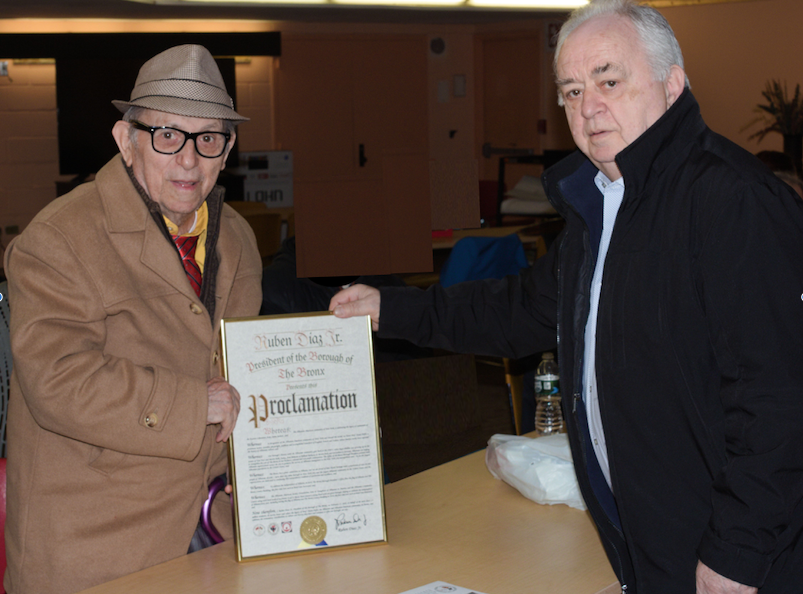
By Rafaela Prifti/

Near to two months, the days in the lockdown city go by without much variation while questions of the collective revival spring up in our minds. Memories of the social past persist as the quarantine that has shaped our lives since last March is expected to be lifted in mid-May. Picking up our lives from the “pause” stemming from the pandemic may still take some mental practice and imagination. I remember two community events that were hosted on March 7 in the Bronx to commemorate teachers and honor heroes whose sacrifices laid the foundations of the Albanian nation. The concert was presented by Alba Life and the afternoon ceremony by the American Albanian Society Foundation. How do hosts and community activists, Kozeta, Qemal Zylo, and Esad A. Rizai remember that day and what are their thoughts on the current situation?
KOZETA AND QEMAL ZYLO

Kozeta Zylo, writer and co-founder of Alba Life School, says that it is very hard not to visit with the grandchildren as she follows the stay-at-home guidelines. “I truly miss our students,” Mrs. Zylo confides, recalling their March 7th concert earlier this year “and the sweet sounds of their voices.” As far as work with Alba Life TV, she conducts interviews via Internet with public health professionals and medical experts around the world to thank them for their service. Her career and life partner, Qemal Zylo, Director and Founder of Alba Life TV and School, reveals that the current isolation in America and around the globe feels unreal. “The highest toll of quarantine weeks has been the inability to get together with our children and grandchildren,” says he, “and not seeing the students, staff and parents.” The domestic routine contrasts sharply with the couple’s very active and dynamic lifestyle before the crises. “We were used to being constantly on the move,” explains Mr. Zylo, “running to community events with the camera equipment or carrying books to and from school. I miss it so much.” Yet they have adapted to the new reality and have moved to broadcast online. The Alba Life TV director mentions that they are bringing to the audience “Albanian greetings from the quarantine” and a special children’s program on Saturdays geared towards education.
ESAD A. RIZAI
The host of the March 7 event at the Belmont Library, Mr. Esad A. Rizai, President of the Albanian American Society Foundation recalls his opening remarks there “Acknowledging and honoring those who have placed the nation’s interest above all else has brought us together today.” Mr. Rizai notes that the day itself carried symbolism and significance. Kosovo’s legendary hero and freedom fighter Adem Jashari, was slayed with some fifty members of his large family by the Serbian police forces in Prekaz on March 7, 1998. The prolific writer, novelist and satirist whose career spans for six decades Naum Prifti was born on March 7, 1932. The office of the Bronx Borough President Ruben Diaz Junior had issued a post-mortem citation to Adem Jashari and a Proclamation to honor the lifework of Naum Prifti. The Founder and President of the Albanian American Society Foundation, Mr. Esad A. Rizai, speaks with reverence about the impact of the “pen and the sword” that best personify two honorees, Adem Jashari and Naum Prifti. He remembers the special guests, community representative and family members at the event: Mr. Hajdin Alijaj, Mr. Avni Karakushi, Mr. and Mrs. Enver and Kade Lajqi from the American Albanian Society Foundation, Ricci Campbell, American actor. In his remarks, Albanian poet and songwriter Isa Brecani highlighted moments of Adem Jashari’s life that has impacted generations of Albanians. With reference to Jashari’s heroic acts, Mr. Rizai says “History has shown that even one person can make a difference,” through the strength of their power or the might of the pen. Julika Prifti, the writer’s second daughter, noted that despite the years, his purity, gentleness and unique humanity are the signature traits of Naum Prifti as a person and a writer. The professional writer, continued his publicist career after moving to America, and also carried out the duties of Secretary of Vatra for over a decade. Imbued with the ideals of the older generation of Albanians and spirit of patriotism, “these men have made us proud as Albanians living in America”, said Mr. Rizai. In part, the Proclamation by President Ruben Diaz Junior of the Bronx representing more than 1.4 million residents stated “In recognition of the Albanian-American community of New York and around the world, we honor Naum Prifti, a prominent writer, playwright, publicist and accomplished translator of English, French and Italian whose timeless works have captured the beauty of the Albanian culture.” Accepting the honor, Naum Prifti said with a chuckle that although he did not choose to be born on March 7th, he did start writing at a very young age, and grew increasingly aware of the exceptional burden that a writer carries. “In the years of the “cultural revolution’ of Albania’s tight communist grip, I was sent to teach in the Divjake region to be ‘reeducated’ after having written a play that was deemed to be ‘ideologically faulty’ by the political standards of the regime.” He remarked that teachers, just like writers and artists are bound by a similar mission because the success of a writer is not measured by the literary awards but rather by the readers’ love and affection for the body of work he has created. “In this sense, the writer is a public persona or a personality with a social status that goes beyond the circle of family and friends into the generations who, have come to know the works of the writer, and have allowed themselves to be entertained as well as educated by them. We are only as good as the humanism we have inspired onto others because art is not its own purpose,” said Naum Prifti.
While the New York governor laid out the terms for a phased reopening to start in over a week, it is refreshing to visit the pre-pandemic memories to revive our social past if only in our minds.
CONVERSING WITH MY FATHER
Along the struggles for freedom, throughout our history, Albanian educators and patriots have embodied the power of the word. To explore further the origins of the term “the pen is mightier than the sword” my father and I looked into the records. Comparisons between words and weapons go back in the Greek civilization, yet the first recorded expression is documented in the historical play Cardinal Richelieu written by English writer and politician Edward Buwle-Lytton. The Chief Minister to King Louis XIII, Richelieu was believed to have discovered a plot to kill him, but as a priest he was unable to take up arms against the enemies. When one of the characters points out: “But now, at your command are other weapons, my good Lord.” Richelieu agrees, by stating: “The pen is mightier than the sword… Take away the sword; States can be saved without it!” The expression quickly gained currency, according to the Oxford Quotations Dictionaries and by the mid nineteenth century “it was commonplace.” Still in 17th century publications and even earlier, variations of the phrase make appearance in print to convey a popular saying of the time “A blow with a word strikes deeper than a blow with a sword”. Going all the way back to the Greek civilizations, Euripides, the poet who died about 406 BC, is credited with writing: “The tongue is mightier than the blade.” In classical times there was a belief that the written word possessed the power to survive “and transcend even the bloodiest events… even if they didn’t actually prevail against arms in the short term.” In the present times, an adequate illustration of the word and weapon comparison is Napoleon Bonaparte. “Four hostile newspapers are more to be feared than 1,000 bayonets,” he is quoted as saying in some official accounts. After Napoleon seized power and proceeded to influence politics of 19th century Europe, he suppressed most of the newspapers in France and sanctioned only a handful of publications. Scholars agree that he respected the press and feared it too. The military mind of the General who crowned himself Emperor of the French realized that the pen, in his own hand could be a weapon, with which he could undermine the allies who had defeated him. He did just that by writing his own memoirs and transforming himself from a bloody minded despot who buried the French Revolution into a fair-minded constitutionalist who saved the Revolution and liberated Europe. On Balzac’s desk sat a bust of the emperor, the base emblazoned with the words “All that he did with a sword, I will accomplish with a pen.”
Then our memories arch back to my father’s play Plumbat e Shkronjave, which two professional theaters made into a production in Albania in May 1978. The inspiration for writing the play came from Professor Skender Luarasi, who first had shared with Naum Prifti the story of the teacher Gjerasim Qiriazi kidnaped by rebel Shahin Matraku. To lure the bandit to take action, the Greek Patrichana had pushed false information that a wealthy gentleman was passing by. In reality, the teacher was on his way to open an all girls’ school in Korca. The Albanian patriots intervened to free Gjerasim Qiriazi who along with his sisters taught at Korca School for girls. Inspired by the true events, my father wrote the play which I still remember for its powerful characters, dialogue and a remarkable twist.
